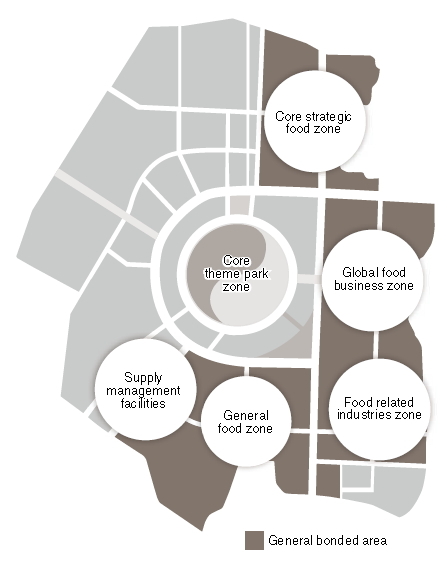International food firms flock to Foodpolis
Chinese companies sign $1.1b worth of deals to operate in Iksan cluster
By Shin Ji-hyePublished : Oct. 14, 2014 - 21:05
A growing number of food companies at home and abroad are displaying a growing interest in South Korea’s food cluster, Foodpolis. More than 100 companies have already signed deals with the Agriculture Ministry here to operate in Foodpolis, which is set to be completed by 2016 in Iksan, North Jeolla Province.
The firms, according to the local government, apparently view Foodpolis as an ideal investment source due to its proximity to China and Japan, and also because of the advantages offered by Korea’s global business network.
Up to 48 foreign companies, including Italy’s Forno d’Asolo, the Netherlands’ TNO and NIZO food, America’s Hampton Grains and France’s SEB, have signed pacts with the Agriculture Ministry to set up shop in Foodpolis. They plan to set up their research centers or regional branch offices within Foodpolis.

“Foodpolis offers superb geographical conditions for foreign companies. The food cluster is within 50 kilometers of an airport and a port, and it also is located within 3 kilometers of local highways, and 20 kilometers from high-speed train stations,” said Lee Ju-myeung, head of the Agriculture Ministry’s Food Industry Policy Bureau. “This makes logistics a dream for these companies.”
Another notable feat for Foodpolis is the interest it has been garnering from the ever-important Chinese market.
Chinese companies have been expressing their intention to use Foodpolis to reexport goods. What they would do is set up a plant within the cluster, then ship the food products back home to cater to the snowballing number of Chinese consumers who prefer Korean brands.
Around 10 Chinese companies including Qingdao Nine-Alliance Foodstuffs, whose annual sales stood at around 1.2 trillion won ($1.1 billion) last year, signed deals with the ministry this year and in 2013. They plan to reexport their goods to China, and also possibly to other overseas market.
“We hope our goods can spread out into the world through Korea’s extensive economic ties with its FTA partners,” said an official from a Chinese company, which signed a pact on the partnership with Foodpolis.
With the government’s strong incentives for the companies in Foodpolis, major local food companies have also chosen to stay in Korea. CJ, Dongwon F&B, Sempio and Harim have signed memoranda of understanding with the Agriculture Ministry to operate in the local cluster.
“We plan to make Foodpolis Asia’s food hub by embracing higher value-added research and development,” Lee Ju-myeung said. The government hopes to see Foodpolis generate 15 trillion won in sales and create 23,000 jobs by 2020.
By Shin Ji-hye (shinjh@heraldcorp.com)
The firms, according to the local government, apparently view Foodpolis as an ideal investment source due to its proximity to China and Japan, and also because of the advantages offered by Korea’s global business network.
Up to 48 foreign companies, including Italy’s Forno d’Asolo, the Netherlands’ TNO and NIZO food, America’s Hampton Grains and France’s SEB, have signed pacts with the Agriculture Ministry to set up shop in Foodpolis. They plan to set up their research centers or regional branch offices within Foodpolis.

“Foodpolis offers superb geographical conditions for foreign companies. The food cluster is within 50 kilometers of an airport and a port, and it also is located within 3 kilometers of local highways, and 20 kilometers from high-speed train stations,” said Lee Ju-myeung, head of the Agriculture Ministry’s Food Industry Policy Bureau. “This makes logistics a dream for these companies.”
Another notable feat for Foodpolis is the interest it has been garnering from the ever-important Chinese market.
Chinese companies have been expressing their intention to use Foodpolis to reexport goods. What they would do is set up a plant within the cluster, then ship the food products back home to cater to the snowballing number of Chinese consumers who prefer Korean brands.
Around 10 Chinese companies including Qingdao Nine-Alliance Foodstuffs, whose annual sales stood at around 1.2 trillion won ($1.1 billion) last year, signed deals with the ministry this year and in 2013. They plan to reexport their goods to China, and also possibly to other overseas market.
“We hope our goods can spread out into the world through Korea’s extensive economic ties with its FTA partners,” said an official from a Chinese company, which signed a pact on the partnership with Foodpolis.
With the government’s strong incentives for the companies in Foodpolis, major local food companies have also chosen to stay in Korea. CJ, Dongwon F&B, Sempio and Harim have signed memoranda of understanding with the Agriculture Ministry to operate in the local cluster.
“We plan to make Foodpolis Asia’s food hub by embracing higher value-added research and development,” Lee Ju-myeung said. The government hopes to see Foodpolis generate 15 trillion won in sales and create 23,000 jobs by 2020.
By Shin Ji-hye (shinjh@heraldcorp.com)



















![[Today’s K-pop] Treasure to publish magazine for debut anniversary](http://res.heraldm.com/phpwas/restmb_idxmake.php?idx=642&simg=/content/image/2024/07/26/20240726050551_0.jpg&u=)